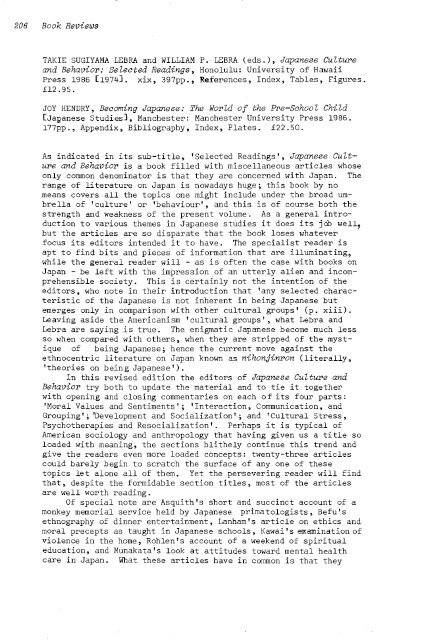CONTENTS NO.I - Institute of Social and Cultural Anthropology ...
CONTENTS NO.I - Institute of Social and Cultural Anthropology ...
CONTENTS NO.I - Institute of Social and Cultural Anthropology ...
Create successful ePaper yourself
Turn your PDF publications into a flip-book with our unique Google optimized e-Paper software.
206 Book Reviews<br />
TAKIE SUGIYAMA LEBRA <strong>and</strong> WILLIAM P. LEBRA (eds.), Japanese Cultupe<br />
<strong>and</strong> Behavior: Seleoted Readings, Honolulu: University <strong>of</strong> Hawaii<br />
Press 1986 [1974]. xix, 397pp., References, Index, Tables, Figures.<br />
£12.95.<br />
JOY HENDRY, Beooming Japanese: The World <strong>of</strong> the Pre-Sohool Child<br />
[Jayanese Studies], Manchester: Manchester University Press 1986.<br />
177pp., Appendix, Bibliography, Index, Plates. £22.50.<br />
As indicated in its sub-title, 'Selected Readings', Japanese Cult,....<br />
upe <strong>and</strong> Behavior is a book filled with miscellaneous articles whose<br />
only common denominator is that they are concerned with Japan. The<br />
range <strong>of</strong> literature on Japan is nowadays huge; this book by no<br />
means covers all the one include under the broad umbrella<br />
<strong>of</strong> 'culture' or 'behaviour', <strong>and</strong> this is <strong>of</strong> course both the<br />
strength <strong>and</strong> weakness <strong>of</strong> the present volume. As a general introduction<br />
to various themes in Japanese studies it does its jab well,<br />
but the articles are so that the book loses whatever<br />
focus its editors intended it to have. The specialist reader is<br />
apt to find bits <strong>and</strong> <strong>of</strong> information that are illuminating,<br />
while the general reader will - as is <strong>of</strong>ten the case with books on<br />
Japan - be left with the impression <strong>of</strong> an utterly alien <strong>and</strong> incomprehensible<br />
society. This is<br />
not the intention <strong>of</strong> the<br />
editors, who note in their introduction that 'any selected characteristic<br />
<strong>of</strong> the Japanese is not inherent in being Japanese but<br />
emerges only in comparison with other cultural groups' (p. xiii).<br />
Leaving aside the Americanism 'cultural groups', what Lebra <strong>and</strong><br />
Lebra are saying is true. The enigmatic Japanese become much less<br />
so when compared with others, when are stripped <strong>of</strong> the mystique<br />
<strong>of</strong> being Japanese; hence the current move against the<br />
ethnocentric literature on Japan known as nihonjinron (literally,<br />
'theories on being Japanese').<br />
In this revised edition the editors <strong>of</strong> Japanese Culture <strong>and</strong><br />
Behavior try both to the material <strong>and</strong> to tie it together<br />
with <strong>and</strong> closing commentaries on each <strong>of</strong> its four parts:<br />
'Moral Values <strong>and</strong> Sentiments'; 'Interaction, Communication, <strong>and</strong><br />
Grouping'; 'Development <strong>and</strong> <strong>Social</strong>ization'; <strong>and</strong> '<strong>Cultural</strong> Stress,<br />
Psychotherapies <strong>and</strong> Resocialization'. Perhaps it is typical <strong>of</strong><br />
American sociology <strong>and</strong> anthropology that having given us a title so<br />
loaded with meaning, the sections blithely continue this trend <strong>and</strong><br />
give the readers even more loaded concepts: twenty-three articles<br />
could barely begin to scratch the surface <strong>of</strong> anyone <strong>of</strong> these<br />
topics alone all <strong>of</strong> them. Yet the persevering reader will find<br />
that, despite the formidable section titles, most <strong>of</strong> the articles<br />
are well worth<br />
Of special note are 's short <strong>and</strong> succinct account <strong>of</strong> a<br />
monkey memorial service held by Japanese primatologists, Befu's<br />
ethnography <strong>of</strong> dinner entertainment, Lanham's article on ethics <strong>and</strong><br />
moral precepts as taught in Japanese schools, Kawai' s e-xamination <strong>of</strong><br />
violence in the home, Rohlen's account <strong>of</strong> a weekend <strong>of</strong> spiritual<br />
education, <strong>and</strong> Munakata's look at attitudes toward mental health<br />
care in Japan. What these articles have in common is that they

















